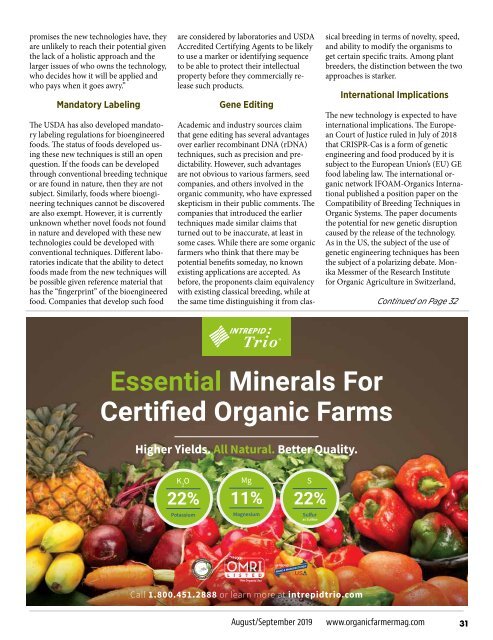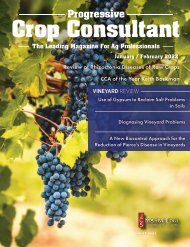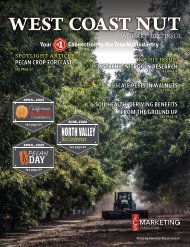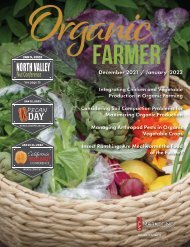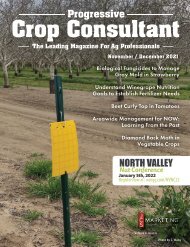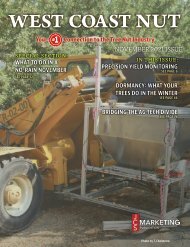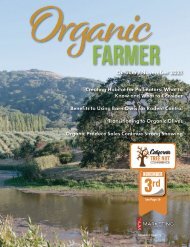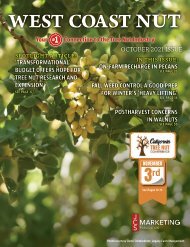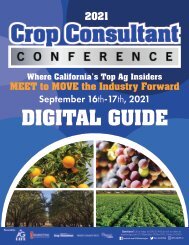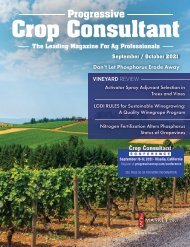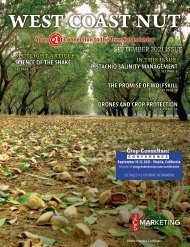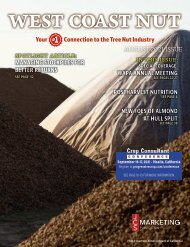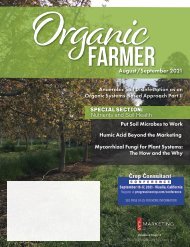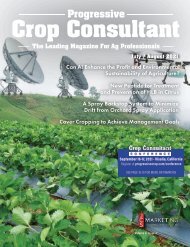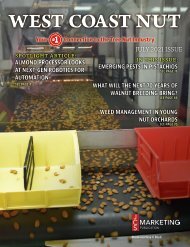Organic Farmer Aug/Sept 2019
- No tags were found...
You also want an ePaper? Increase the reach of your titles
YUMPU automatically turns print PDFs into web optimized ePapers that Google loves.
promises the new technologies have, they<br />
are unlikely to reach their potential given<br />
the lack of a holistic approach and the<br />
larger issues of who owns the technology,<br />
who decides how it will be applied and<br />
who pays when it goes awry.”<br />
Mandatory Labeling<br />
The USDA has also developed mandatory<br />
labeling regulations for bioengineered<br />
foods. The status of foods developed using<br />
these new techniques is still an open<br />
question. If the foods can be developed<br />
through conventional breeding technique<br />
or are found in nature, then they are not<br />
subject. Similarly, foods where bioengineering<br />
techniques cannot be discovered<br />
are also exempt. However, it is currently<br />
unknown whether novel foods not found<br />
in nature and developed with these new<br />
technologies could be developed with<br />
conventional techniques. Different laboratories<br />
indicate that the ability to detect<br />
foods made from the new techniques will<br />
be possible given reference material that<br />
has the “fingerprint” of the bioengineered<br />
food. Companies that develop such food<br />
are considered by laboratories and USDA<br />
Accredited Certifying Agents to be likely<br />
to use a marker or identifying sequence<br />
to be able to protect their intellectual<br />
property before they commercially release<br />
such products.<br />
Gene Editing<br />
Academic and industry sources claim<br />
that gene editing has several advantages<br />
over earlier recombinant DNA (rDNA)<br />
techniques, such as precision and predictability.<br />
However, such advantages<br />
are not obvious to various farmers, seed<br />
companies, and others involved in the<br />
organic community, who have expressed<br />
skepticism in their public comments. The<br />
companies that introduced the earlier<br />
techniques made similar claims that<br />
turned out to be inaccurate, at least in<br />
some cases. While there are some organic<br />
farmers who think that there may be<br />
potential benefits someday, no known<br />
existing applications are accepted. As<br />
before, the proponents claim equivalency<br />
with existing classical breeding, while at<br />
the same time distinguishing it from classical<br />
breeding in terms of novelty, speed,<br />
and ability to modify the organisms to<br />
get certain specific traits. Among plant<br />
breeders, the distinction between the two<br />
approaches is starker.<br />
International Implications<br />
The new technology is expected to have<br />
international implications. The European<br />
Court of Justice ruled in July of 2018<br />
that CRISPR-Cas is a form of genetic<br />
engineering and food produced by it is<br />
subject to the European Union’s (EU) GE<br />
food labeling law. The international organic<br />
network IFOAM-<strong>Organic</strong>s International<br />
published a position paper on the<br />
Compatibility of Breeding Techniques in<br />
<strong>Organic</strong> Systems. The paper documents<br />
the potential for new genetic disruption<br />
caused by the release of the technology.<br />
As in the US, the subject of the use of<br />
genetic engineering techniques has been<br />
the subject of a polarizing debate. Monika<br />
Messmer of the Research Institute<br />
for <strong>Organic</strong> Agriculture in Switzerland,<br />
Continued on Page 32<br />
Essential Minerals For<br />
Certified <strong>Organic</strong> Farms<br />
Higher Yields. All Natural. Better Quality.<br />
Continued on Page 31<br />
Call 1.800.451.2888 or learn more at intrepidtrio.com<br />
<strong>Aug</strong>ust/<strong>Sept</strong>ember <strong>2019</strong><br />
www.organicfarmermag.com<br />
31


